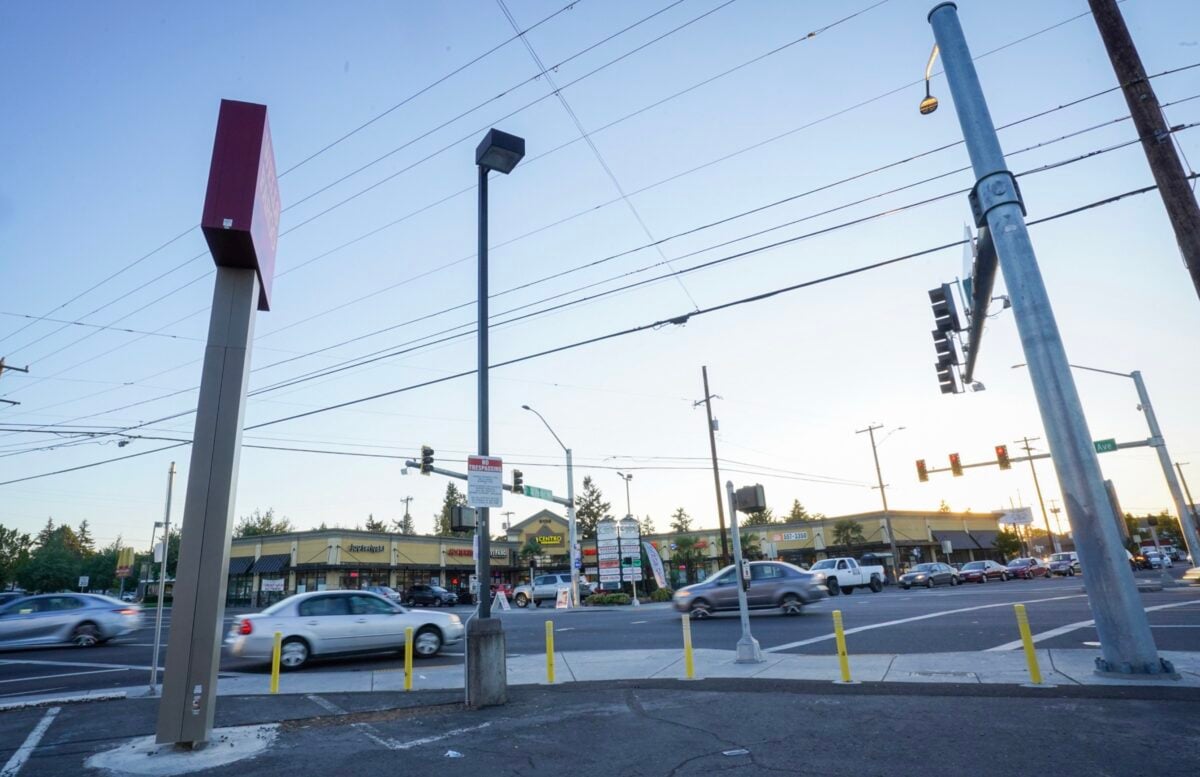| HB 3113 “Great Streets Bill” Hearing |
|---|
| — Thursday, 5:00 pm Joint Committee on Transportation — Bill overview — Hearing information |
It’s finally time for Oregon lawmakers to consider a new pot of funding that would improve safety on main streets and orphan highways across the state.
In January 2022, the Oregon Department of Transportation (ODOT) launched a new program called “Great Streets.” It came as the agency faced growing pressure to speed up safety projects on urban arterial streets after two people were killed while walking across Northeast 82nd Avenue (an ODOT-owned highway) in separate collisions within two weeks of each other.
Those tragic deaths forced ODOT and their bosses on the Oregon Transportation Commission (OTC) to finally reckon with the boiling pot of outcry from local leaders who’ve warned of safety risks on these dangerous and notoriously deadly arterials for decades — and who feel Oregon’s vast spending on freeway megaprojects doesn’t reflect urgent community needs. As ODOT took steps to transfer ownership of 82nd to the City of Portland, they also realized they had to put more non-freeway money on the table in a show of good faith.
In March of last year, the OTC allocated $50 million from President Joe Biden’s infrastructure bill to kickstart the Great Streets program. There is so much demand for non-freeway projects across the state that they received grant applications totaling $140,726,840 — over 400% of that $50 million. Those grants will be awarded later this fall and ODOT has said they will use the first tranche of funded as a “proof of concept” so they can refine the program for future disbursements.
The program is specifically meant to fund projects that, “improve safety and multimodal access on state highway corridors that also act as community main streets.” ODOT lists things like sidewalks, bicycle facilities, bus shelters, traffic calming devices, street trees, road diets, and crosswalks as eligible investments.
Now it’s the Oregon Legislature’s turn to step up and put more money into this pot. The question is: How much are they willing to spend?
There are two bills in the legislature that would seek to fill up the Great Streets coffers, and one of them will get its first public hearing tonight (4/6 at 5:00 pm) at the Joint Committee on Transportation.
House Representative Khanh Pham (D-SE Portland), a former community organizer who lives just off 82nd Avenue, is chief sponsor on House Bill 3516, which seeks $200 million out of the state’s General Fund (a $25 billion pot of personal and corporate income taxes) over a two-year period. There’s an nearly identical bill, HB 3113, sponsored by House Rep. and Joint Transportation Committee Co-Chair Susan McClain (D-Hillsboro) that leaves the funding amount blank.
HB 3113 is the one that will get a public hearing tonight, and the lobbying effort to make sure the amount is as high as possible has already begun.
“With an additional $100 funding in funding made possible via HB 3113, we can reduce the number of serious injuries and deaths on our most dangerous Orphan Highways while strategically investing in vibrant, safe, and sustainable main streets across Oregon.” reads a statement on a petition from The Street Trust. The nonprofit is working hard to turn out supporters of the bill. As of this morning over 300 Oregonians from 72 different zip codes have signed the petition.
There’s major support for this program in large part because Oregon’s State Highway Fund has constitutional restrictions about what it can be spent on (“exclusively for the construction, reconstruction, improvement, repair, maintenance, operation and use of public highways, roads, streets and roadside rest areas”). Money from the General Fund would give cities and counties much more flexibility to fund a wider array of projects.
Dan Huff, the city manager for the City of Mollala, a small town in Clackamas County about 30 miles south of Portland, wrote in his testimony for the bill that, “funding constraints limit our ability to focus on on… the safety, multimodal accessibility, equity, and climate mitigation enhancements that align with mutual state and city goals. HB 3113 would allow us to prioritize larger projects such as widening and access improvements for bikes/pedestrians on Highway 213.”
Michael Andersen, a senior housing and transportation researcher with the Sightline Institute, a nonprofit think tank, supports the bill because anything that reduces the need for car ownership, is an economic boon for the State of Oregon. “One of the biggest ways to reduce the cost of new buildings, with the fewest negative tradeoffs, is simply for their users to need fewer parking spaces,” he wrote in testimony submitted to the committee. “When the residents of a building or the customers of a store don’t need as many parking spaces, then all economic activity becomes cheaper and the associated space and money can be put to other, more profitable use.”





